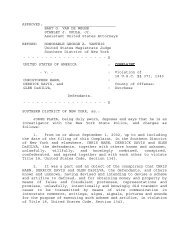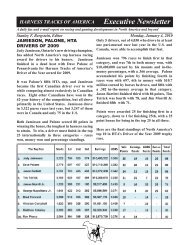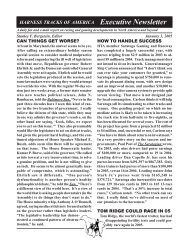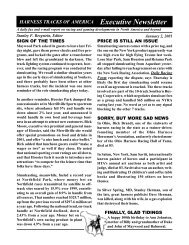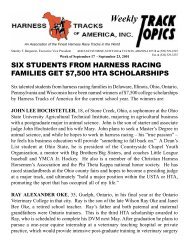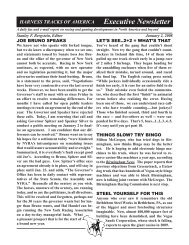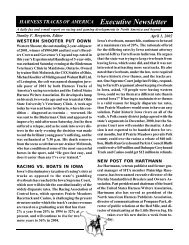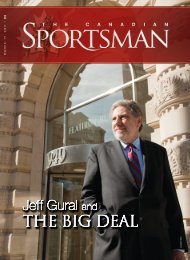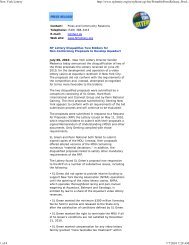2002 - Harness Tracks of America, Inc.
2002 - Harness Tracks of America, Inc.
2002 - Harness Tracks of America, Inc.
Create successful ePaper yourself
Turn your PDF publications into a flip-book with our unique Google optimized e-Paper software.
HARNESS TRACKS OF AMERICA<br />
Executive Newsletter<br />
A daily fax and e-mail report on racing and gaming developments in North <strong>America</strong> and beyond<br />
Stanley F. Bergstein, Editor<br />
THE GOVERNOR SPEAKS OUT<br />
The Arizona Supreme Court slammed the door on<br />
the state’s racetracks yesterday, denying an injunction<br />
request by the state’s horse and dog tracks<br />
to stop Gov. Jane Hull from signing gambling compacts<br />
with Indian tribes. It was the third time in<br />
three days that the tracks lost in court, and this<br />
time the governor, with a mandate from voters,<br />
took to the press to give her response. In a long<br />
open letter titled “My Turn” in The Arizona Republic,<br />
the state’s biggest newspaper, she thanked<br />
voters for supporting Proposition 202, which denied<br />
the tracks slots, and gave her rationale for<br />
her actions. “I spent my first years in Arizona as<br />
a teacher on an Indian reservation,” the governor<br />
wrote, “and saw poverty so pervasive that the<br />
memory lingers even now. In time, my family grew<br />
and prospered and Arizona grew and prospered.<br />
However, prosperity didn’t extend to our Indian<br />
reservations.” Gov. Hull went on to say she was<br />
skeptical at first that gaming would improve Indian<br />
lives, but she came to see that gaming “had<br />
made a real difference to thousands <strong>of</strong> tribal members<br />
in Arizona.” For that reason, she said, she<br />
began to renegotiate compacts. She accused the<br />
state’s tracks <strong>of</strong> “a campaign <strong>of</strong> misinformation<br />
and litigation,” and said millions were spent to create<br />
confusion at the ballot box. She concluded by<br />
saying that the voters <strong>of</strong> Arizona had spoken, and<br />
she intended to sign new compacts before the end<br />
<strong>of</strong> her term. “It is time,” the governor wrote, “to<br />
put this issue to bed.”<br />
COMMISSIONERS SPEAK, TOO<br />
While Arizona’s governor spoke out, deposed racing<br />
commissioners in neighboring New Mexico had<br />
their say too. Three <strong>of</strong> them, fired by Gov. Gary<br />
Johnson to keep them from voting on a new track<br />
on the Texas border, wrote letters calling<br />
their dismissal “New Mexico politics at<br />
its worst.”<br />
November 27, <strong>2002</strong><br />
Part <strong>of</strong> the controversy is the issue <strong>of</strong> R. D.<br />
Hubbard’s application for the new license, in view<br />
<strong>of</strong> his problems that led to him losing his license to<br />
operate in Indiana in the now famous case <strong>of</strong> importing<br />
prostitutes from Las Vegas. The New<br />
Mexico Gaming Control Board’s attorney had recommended<br />
Hubbard’s license not be renewed, but<br />
the commission chose to vote on it despite that<br />
fact, and the governor ended that prospect by firing<br />
three <strong>of</strong> them, leaving the commission without<br />
a quorum to act. The incoming governor, Bill<br />
Richardson, favors a track in Hobbs, and the betting<br />
in New Mexico is that Hubbard will be the<br />
man who gets to build it.<br />
WINNING IS THE GAME, FOLKS<br />
First the Greektown Casino in Detroit, and now<br />
Suffolk Downs in Boston. The Detroit casino<br />
barred nine gamblers who were winning too much<br />
at video poker, and tried to rationalize their decision<br />
by saying it would open up machine opportunities<br />
for others who weren’t winning. Suffolk<br />
Downs in Boston went to the Massachusetts racing<br />
commission and asked to conduct win betting<br />
only on state-bred races, and got it. The move<br />
came after the track had a $24,000 minus pool after<br />
a plunger bet $310,000 to show on a state-bred<br />
race for juvenile fillies. Instead <strong>of</strong> going to the<br />
legislature to get the $2.20 minimum pay<strong>of</strong>f in<br />
Massachusetts changed to $2.10, Suffolk asked<br />
for the “win only” provision, and used it in the<br />
Massachusetts Oaks, where the 3-10 favorite<br />
wound up second in a six-horse field, beaten 12<br />
lengths by a filly owned by a 14-year-old high<br />
school student. The Boston Herald had fun with<br />
the story, and in Detroit Free Press columnist Brian<br />
Dickerson took Greektown apart, saying its<br />
publicist’s claim that the casino “loves winners” is<br />
like saying Augusta National “values diversity.”<br />
We’re <strong>of</strong>f for Thanksgiving, but will be back<br />
with more Friday. Have a great holiday.




